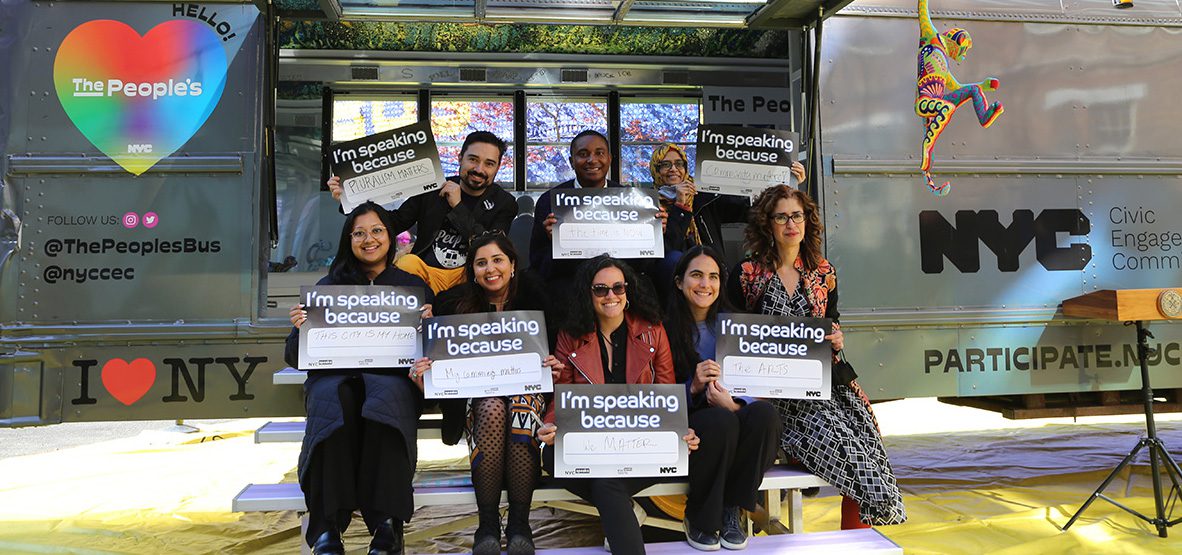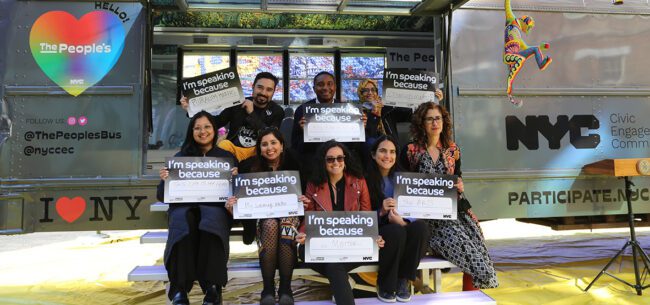on Dec 20, 2022
Listening to New Yorkers about their government

Listening to New Yorkers about their government

This opinion piece by Sheena Wright, Shango Blake and José Serrano-McClain was originally published in the Daily News.
Bold investments to strengthen New York City’s civic infrastructure are key to a more equitable future and to meet the scale of the challenges we face as a city.
We know that historically the design and execution of city policies and programs are less equitable and generally less effective when decisions are made in isolation from the community.
We know that New Yorkers aren’t afraid to speak up and tell the government what they think, but government too often doesn’t know how to listen. Even when it does, government doesn’t have the infrastructure to effectively act upon community input.
Luckily, almost every New York City agency engages New Yorkers in one way or another.
But, community engagement is not coordinated among the 50-plus city agencies. On top of that, engagement teams are often understaffed and under-resourced, and efforts to engage New Yorkers have historically been more reactive and designed in ways that exclude working New Yorkers, parents, immigrants and disabled New Yorkers. All of this leads to duplicate, overlapping and contradictory engagement efforts that further distance New Yorkers from their government — sending the message that their input is not valued.
Our civic infrastructure — the practices, processes, supports and data that ensure that New Yorkers can easily and effectively collaborate with government — needs a refresh. We must bring rigor to community engagement — set a standard of excellence to which we hold agencies accountable. And we must provide the resources and tools agencies need and want to support and expand their efforts to engage community residents, partners, clients, participants, and neighbors.
Crucially, the city must have a way to coordinate these efforts, so that they add up to greater than the sum of their parts.
The Adams administration is pioneering new, exciting ways to deepen democracy by expanding meaningful opportunities for direct participation in government.
Starting on Day One, the Adams administration invited the partnership of NYC Speaks, a collaborative effort of City Hall, philanthropic partners, and a vast network of community leaders and civic institutions to learn from tens of thousands of New Yorkers from all walks of life about their priorities, their problems, and their solutions in order to shape the priorities of the incoming administration.
Over the last year, NYC Speaks collected more than 3 million data points from New Yorkers representing every residential zip code through the largest public policy survey in New York City history, convened nearly 5,000 residents as part of more than 220 community events, and collected moonshot policy ideas from nearly 450 city staff.
The community-generated data showed that New Yorkers are aligned around housing-first solutions, mental health investments in our public schools, climate-resilient neighborhoods and community spaces, jobs in the green economy, and participatory policymaking.
The rigor of this data served as a center of gravity for bringing senior government officials to help solve the problems New Yorkers said they cared about most. Through a series of workshops, senior government leaders, non-profit service providers, activists, academics, and philanthropists together developed policies that were both responsive and actionable.
The culmination of the survey data and Community Conversations, and coordination between civic institutions and mayor’s administration, five “North Stars” emerged:
-
- North Star #1: Formerly incarcerated New Yorkers will have the support and resources they need to succeed when they return home.
- North Star #2: NYC public school students will have access to culturally competent mental health resources.
- North Star #3: Historically disinvested neighborhoods will be prioritized for capital investments in community and recreation spaces that support social, economic, and climate resilience.
- North Star #4: Young New Yorkers and residents in Environmental Justice communities will have access to green career pathways created by city-led decarbonization and resilience efforts.
- North Star #5: NYC government will be transformed into a national model of collaborative, inclusive, and accountable governance that strengthens democracy, expands civic engagement, and enhances civic trust.
Last week, NYC Speaks unveiled its first annual Action Plan that includes a set of tangible policy commitments that will serve as the basis upon which the administration, private philanthropy, and civil society will continue to build over the coming year.
NYC Speaks demonstrates that despite the fragmented nature of civic discourse, there are methodical ways to find common ground, and that our government can act in ways that are bold and strategic when provided with a quantified mandate.
NYC Speaks is just scratching the surface of what must be done to strengthen our city’s civic infrastructure if we are to develop solutions commensurate with the scale of the challenges we face.
- Wright is deputy mayor for strategic initiatives. Blake and Serrano-McClain are the co-executive directors of NYC Speaks.